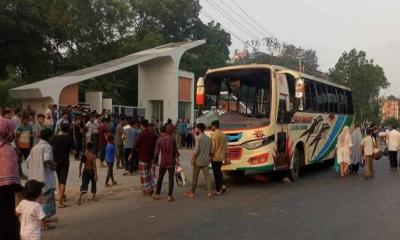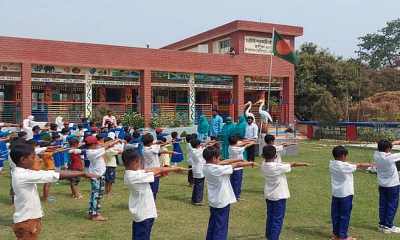Germany is known for their robust economy and education system. Being one of the strongest economies in the world, there is a constant need for foreign labor in the economy in its diverse sectors. So how does Germany go about hiring this foreign labor? That is where Ausbildung comes in. In this article, we will tell you everything you need to know about Ausbildung for non-EU stuents and how students from Bangladesh can apply for Ausbildung in Germany.
What is Ausbildung?
Ausbildung means vocational training or apprenticeship. Germany has a strong industry-oriented job education which falls under its diverse categories of industries.
So rather than simply diverting the prospective workforce into class-based theoretical education, Ausbildung allows for a combination of theoretical and industry-oriented training to make every candidate industry ready.
This allows for a hands-on experience that churns out a more effective and skilled labor force all the while reducing pressure on the higher academic degree. Unlike other countries of the world, Ausbildung is an important part of the German education system and an integral gateway to the industry.
Types of Ausbildung
In Germany, there are several types of "Ausbildung" or vocational training. The most common types of "Ausbildung" in Germany include:
Dual vocational training ("Duale Ausbildung")
Dual vocational training is the most common type of Ausbildung in Germany. In this curriculum, an Azubi or apprentice goes through both theoretical as well as practical learning. It’s a mix of technical as well as textbook learning and can last up to two and a half to three years. Apprentices are generally absorbed as skilled labor in their major fields.
School-based vocational training ("Schulische Ausbildung")
School-based vocational training limits the learning prospects to the classroom only. In this type of Ausbildung, an Azubi will strictly be part of theoretical learning in a vocational training or technical training institute. Most of the students graduating from Schulische are generally certified, technicians.
Further vocational training ("Weiterbildung")
This form of training is for individuals who have already completed vocational training or have significant work experience in a particular field. It provides additional qualifications and skills that can help advance their career or improve their job prospects.
Requirements for Ausbildung for Non-EU Nationals
The requirements of Ausbildung differ according to the profession. It also differs depending on whether you are applying as a German citizen, EU, or Non-EU citizen. The general requirement is to have a certain level of German language proficiency as well as means of supporting oneself during the stay. Additionally, an Azubi will also need to have completed at least 10 years of formal education in their home country.
Here`s an outline of the required document for a non-German perspective Azubi.
Proof of citizenship in a foreign country
If you are applying from outside Germany, you will need to show valid documents related to your citizenship status. Typically being a valid citizen and holding a valid passport is enough.
Proof of German language proficiency
Some Ausbildung opportunities may require you to have German language proficiency upfront. Schulische Ausbildung requires German language proficiency upfront as the complete training is theoretically based. On the other hand, Duale Ausbildung often has provisions for on-the-job German language training.
Typically, the Ausbildung may have a language requirement of up to B2 or C1. The higher the technical difficulty of the job, the higher will be the German requirement. You can either provide the TestDaF or Goethe-Institut certificate as your language proficiency proof.
Educational transcripts and diplomas
Some vocational training may require up to 12 years of formal education in the native country before applying for Ausbildung. It varies depending on the type of vocational training you’re applying for. But most Ausbildung opportunities accept a 10-year formal education certificate.
CV or Resume
A prospective Azubi will need to submit an academic and experience-related resume. The level of education and prior experience are strong contributors to the Auzbildung selection process.
The candidate will also need to write a cover letter with each application. The cover letter will serve as a statement of purpose to show your intent as well as your industry fit for the apprenticeship.
Aptitude Test
Some Ausbildung opportunities, specifically highly technical positions will conduct an aptitude test before hiring for a position. These are generally conducted to assess the suitability of a candidate.
Proof of Financial Resources
If you are applying for a Duale Ausbildung, you will receive a monthly stipend. However, if you go for the Schulische route, then you will need to survive on your own. In both cases, the German authorities require proof of financing to support the stay and education in Germany.
How to Apply to Ausbildung as a Foreigner
The process of Ausbildung is fairly easy but a long one. As a foreigner, there are certain steps you need to follow to land your dream apprenticeship in Germany. Here’s what you need to do.
Research Programs
The first step is to find the right Ausbilding program for you. There are many ways to research the programs. You can head over to Bundesagentur für Arbeit’s Ausbildung as it has the most detailed and comprehensive list of over 100 different streams of apprenticeships.
Check for Eligibility Criteria
Here you will need to check whether your CV matches the Ausbildung requirement of your selected stream. Check whether the educational level as well as the German proficiency level matches or not. Some Ausbildung programs require a prospective Azubi to be already in Germany while applying. Check for these requirements before you apply.
Apply For a Visa
After you apply to a vocational training program, you will need to apply for a visa upon your selection. You will need to prepare financial documents to be eligible for the program as well as a German visa.
Obtain a Work Permit
If you are opting for the Duale Ausbildung, you will need to obtain a work permit from the German government. But if you are going for the Schulische route, you won’t have to get a work permit immediately.
How Much a Bangladeshi Student Can Earn From Ausbildung?
German government explicitly states that Ausbildung should not be considered a primary source of income. Rather it is a stipend meant to cover the living expense of the Azubi.
The salary of the apprentice varies depending on the industry and the technical level of the training as well as prior experience.
As of 2021, an Azubi can expect to earn around 1018 euros per month in the first year with 1103 and 1214 euros in the subsequent two years. This amount roughly amounts to 114390 BDT for the first year with 123941 BDT and 136414 BDT per month in the subsequent years (1 EUR = 112 BDT).
However, this is the median stipend for apprenticeship across industries. In reality, the stipend can be as low as 300 euros to as high as 2500 euros per month.
Final Words
Ausbildung is a great opportunity for those wishing to build a career in the technical sector. Germany is currently facing a skilled worker crisis with their annual workforce shortage hitting near about 400,000. In this scenario, Ausbildung is the perfect place to kickstart a career in Germany leading to permanent residency. Bangladeshi Students can apply for Ausbildung in Germany to build careers in technical sector.







































